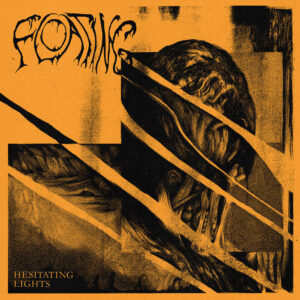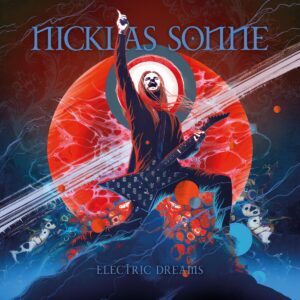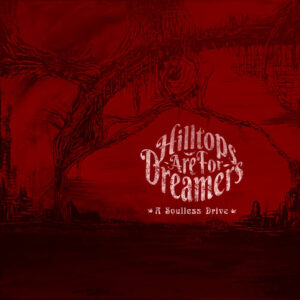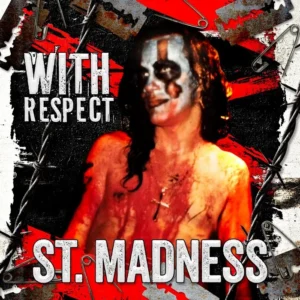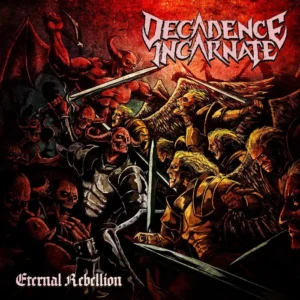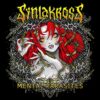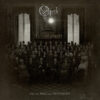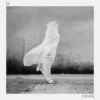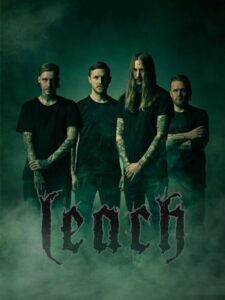Ron Vanacore
Curse the Son
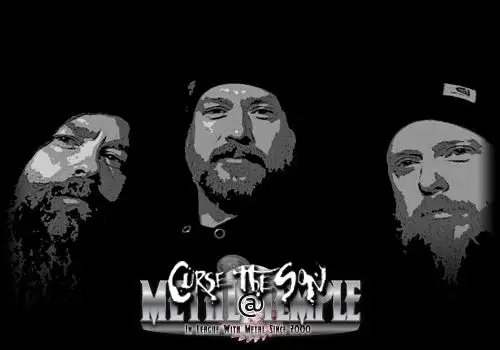
(this link will open in a new window)" target="_blank" href="http://[MA GDPR YouTube] Invalid video id." rel="">http://

There was a vision. I had just come out of a band called SUFFERGHOST which was a Stoner/Doom band, but it was more on the Stoner side. It was a trio, and one of the key guys in the band was Tony Buhagiar (guitar). We hooked up over the Internet, and we started making music for a couple of years. We released a couple of things (EP, "Leave The Church," 2006; LP, "Thaw," 2007). We started as just a fun band to kind of play in the basement and to create stuff, but then we started to get a lot of positive feedback — this was back in the Myspace days — so we decided to take it a little more seriously and started rehearsing for shows. About two months into it he suffered an aortic dissection. Essentially, his heart exploded in his chest. He just happened to be at the hospital at the time or else he would be dead—they call it a widow maker. Because of complications from that, he ended up being paraplegic and moved from Rhode Island back to his mother's in California.
What was a great band and a wonderful working environment, a great team, got ripped away from the both of us in a blink of an eye. I took about a year off, because I was just so despondent and depressed about what had happened. We would talk on the phone and I would say, "Dude, I keep trying to put music away. I want to just put it down." And he'd say, "You can't. You've got to keep going." At this point, he was in rehab and in and out of hospitals. So I said, "Alright, I'm going to put this thing together, and I'm going to do things the way I want to do them."
The CURSE THE SON name had been around for a while. I had used it in bands in the past, different styles of music and things like that. I always liked the name. I had a huge backdrop already printed up and I had my merch machine, so there was no reason to start again with a brand-new name. I sat in this room that I'm in right now for probably about three or four months by myself with a little digital track, putting ideas together with a little sample drums and that kind of stuff. I came up with the first two songs, "Anullus Of Zin" and "Hemicrania Continua." Then I went into my friend's studio a couple of months later and laid those two songs down. I played all the instruments. When I was happy with that, I played it for some people, and there was good feedback. Then I wrote and recorded two more, and then we just threw those together as our EP "Globus Hystericus."
The original thought behind the EP was to make music that I wanted to do without interference from anybody. I just wanted to make the heaviest, doomiest thing I could possibly make in the world. I wasn't trying to be commercial with it, as you could tell on there. No real hooky choruses. The songwriting is more linear as opposed to cyclical. It's one long event. I wanted to see how far I could push it and what the reaction would be. I also wanted to use it as a recruiting tool to get people into the band.
Well, you know, it's funny, I've had that reaction from a lot of different people, thinking automatically that it's more religious based or that judging by the album cover and the band name they were going to get something different than what they had. I've been asked this question a million times. It's one of the few things that I'm trying to keep somewhat mysterious about the band, because I feel that in today's day and age, especially with the Internet, you can find anything out. Back in the day music was more mysterious, it was more of a religious thing where you didn't know everything about these guys. You got the album; you got the lyrics. If you were lucky, you got a poster. There's certain things that I'm still trying to retain some mystery around, but I will say that it does have a specific meaning. It did come from a specific thing, but I like to leave the interpretation open. It's different, but I will say that it's not anti-religion. In fact, I'll give you the biggest hint I've ever given anybody — It's about genetics. That's what it's about.
Those were all redone at the request of the guys that were in the band at the time. They said to me, "You know, we've been playing these songs for a year or so. When we go into the studio, would you mind rerecording those and maybe adding a couple more?" My intention was for the first record to be all new stuff, but they had asked me if we could record them as a band. I said, "Sure, why not?" We rerecorded those four songs and then added the other three that we had written together as a band.
There is a concept behind them. I've been trying to be somewhat thematic. I thought of these one-word titles that would have a lot of impact, and I felt like I wanted to continue those themes throughout the existence of each album. "Klonopain" is obviously a play on Klonopin the brand name for the medication Clonazepam. That record is about a struggle I had. I'd been on medications for a while for depression and anxiety and stuff like that. It was a time in my life when I got off of the medications way too quickly, ended up going into severe withdrawals, and had a mental breakdown. I pretty much lost my shit and was thinking about suicide daily. It was probably the blackest period of my life. I had anxiety attacks from the moment I woke up to the time I went to sleep. That entire record, all the songs, are about what was happening at that time.
The cover of that record is actually a picture I took of the house I was living in at the time. That house to me was haunted. I never heard any ghosts or anything like that, but there was a heavy, pressing vibe that made you feel like you weren't wanted. That picture was the perfect representation. The window that's the main focus of the picture is the bedroom window where I would lay and stare out of because I would never get out of it. Yeah, so there's a theme there.
Interestingly enough, it was from a feature on a news site that was showing old creepy Halloween pictures and costumes from the 1910's and 1920's. Just homemade costumes that really looked very scary. I was flicking through them, and I saw that picture. There's this thing inside of me that clicks, I know that's what I want to use. When I saw that picture, I felt it was so strong, so evocative but also open to interpretation. I actually chose the picture before I decided on the album title or anything.
It depends. If I'm looking around and I happen to see something, I might buy it and hold on to it for five years because I know I'm going to use it. If I see specific images that ring that bell when I see them — it's an automatic response — I'll buy it. I'll contact the artist or photographer and buy it just to have it in reserve so that I have it ready.
The "Isolator" picture was another one. I knew I wanted a scarecrow-lonely-in-the-field kind of thing. I couldn't find the actual artist or the photographer for the first image I had chosen, so I kept looking. Then I happened to find the one that I used and bought the rights for that one from the artist.
With "Excruciation," I wanted to stick with black and white covers, but this picture particularly stuck out to me. It spoke a lot to what I had an idea the record was going to be about. Because the record itself is so different from the other stuff we did, I wanted to give it a visual difference as well. When I saw that picture, I contacted the artist and actually grabbed a couple of his things because I thought he was pretty good and nobody was using his stuff. I don't know if you remember the movie "Alien." In the original trailer it said, "In space, no one can hear you scream." It's kind of like that. There's this skull planet floating in the middle of nowhere screaming and nobody can hear it. Again, it all ties in with the material on the record.
While most of the songs on "Psychache" have a drug-themed title, most of the songs are very personal songs. The only one that's really not very personal was the Henry Anslinger song [first commissioner of the Federal Bureau of Narcotics]. It's personal, but it's not like my life, obviously. That was like our "Sweet Leaf." "Spider Stole The Weed," for instance, isn't necessarily about weed, it's about struggle. "Somatizator" is about stuff that happened in my past. "Valium For?" is obviously a play on SABBATH's "Volume IV." But again, we're getting back to more Benzodiazepines and stuff like that, because at that time I was being prescribed different medications and trying to find the right one. So, creating music and writing lyrics is almost therapeutic unto itself. It gives you a release. It gives you a way to work through your stuff. As I work through my stuff, I write lyrics about it or express my different feelings visually or musically or lyrically or whatever.
Yeah, I'm a mental health therapist, a licensed professional counselor. That's what I do for a living. I'm a therapist. It's interesting because my past kind of led me to my future. Because my past was so screwed up, I want to help people in way that I couldn't be helped. For the past six or seven years, I've been doing mental health therapy. It's a strange circle, the way life comes around.
A lot of things you just mentioned, the most specific being we changed bass players. The bass player we had on the first two records moved to Florida, so we got a different bass player, Brendan Keefe. The drummer that I had at the time, Michael Petrucci, was a very schooled, skilled drummer. He was on the second and third records, and he always wanted to have a bass player to really play off of. I said, "I know the perfect guy." I brought in Brendan and he's very, very strong willed. He's got a heavy blues bass background. I have a long history with Brendan. We've played together since the late 90's. We actually played together first in a BLACK SABBATH cover band. I knew he was the one I wanted because he's a monster player, but he's also a monster on a stage. He just dominates. He gets in people's faces; he puts on a good show.
When he joined the band, we spent an entire year taking all the songs that we had written for the record and reworking them. We went through each song, probably spent about a month on each one, and just reworked them. He wanted to filter them out himself and see what he thought about them. Basically, we went back and reconfigured the songs. Put them together in a way that we thought was proper.
So now we have reconfigured songs, we have a new bass player who brought new life to the band and helped to reinvigorate the drummer, and then we used a different studio, Dirt Floor. The first two records I did at my friend's house. I was the producer, engineer, yadda, yadda, yadda. On "Isolator" we went to a studio which is not really a studio. It's more of a cabin in the woods set up as a studio.
It really is because it's not that stifling sterile environment. You just feel like you're hanging out at somebody's house. It was wonderful. We set up in the guy's kitchen. We pushed the kitchen table out of the way. The drums were right near the refrigerator, the bass player was near the sink, I was standing near the wall, and we're all looking at each other. There's a big plexiglass window. It was a nice summer day. We're overlooking this nice river. The vibe was perfect; it was awesome. So, there's a lot of reasons "Isolator" sounded different and why it seemed to take a much bigger jump.
I really enjoy having that fat, huge sound at the bottom, that really thick bass sound. I always have. I like having parts where it is just the bass by itself. I guess it goes back to certain bands like BLACK SABBATH. There's a lot of parts where it was just Geezer doing his thing. In terms of the frequency aspect of it, I just feel like it really gives it solid balls.
It's funny that you say that about the previous records because Brendan would probably say, "What, are you kidding?" He came into the band and he was just like, "Dude, you got to mix the bass up a little higher in the mix! I want to hear myself." And I was okay with that. He didn't want to just follow the riff note for note, which is what we were doing the first couple records. The bass was basically a frequency underneath the guitar. Once Brendan joined, it became a much more independent, a true power trio thing where everybody's doing something different all the time.
The reason there is so much of Brendan is because I don't really play lead guitar at all. I'm not a very good lead player, so we want to do something different and have the bass player almost be the lead. There are certain parts of songs where you can hear him, and he'll go out front and do a lot of stuff. So we kind of like to flip the whole preconceived thing on its head and just be like, "Okay, well, the guitar player is going to hold it down, but the bass player is going to go in and create the texture."
Going into "Excruciation" was entirely different than any other record, so that's probably a reason. We had a lot of drama. We lost our drummer, Michael, the guy that was on "Isolator." He had been in the band for six years, so that was a huge loss for us. He developed severe tinnitus so he couldn't play with us any longer because we play very loud. That was the first blow. That happened while we were touring for "Isolator."
We were lucky enough to find a replacement for him almost immediately, which is unheard of, especially for somebody who is so good. That guy toured with us through November of 2017, but there were personality conflicts with him. He was he was a bit younger than us. He didn't really get us, and we didn't really get him. When it came time to write, it was obvious we weren't in the same place, so he ended up leaving the band, which kind of screwed up everything. It was back to the drawing board. It took us about four or five months to find our new drummer, Robert Ives.
Once we found him, we had a bunch of stuff that we had to get done. I had booked a lot Stoner/Doom festivals for 2018 and we needed a drummer for those. We had one in Maryland, one in Connecticut, one in Pittsburgh. From the time he joined we were constantly rehearsing the songs, trying to get them up to snuff so that we were ready for these shows. We weren't even considering writing yet.
When we started writing that following Fall, it was mostly Brendan and I writing together because our drummer lives in Massachusetts, so he wasn't always available. And then Brendan got in his bike accident. That was November of 2018. Once that happened, everything went to the side for a while. We didn't know what would happen so we didn't play. I think Rob and I got together a couple of times, but we weren't really getting much out of it. We waited and waited and waited.
Brendan had a guitar with him to keep himself sane in the hospital. He started putting together a couple of things on his own. When he got out, he said, "You know, we've got to start." For the first time we didn't really write very much as a band. We might have worked on the songs as a band to finish them up, but in terms of from birth on, not a lot of these songs were born out of jamming. I wrote a lot of the songs on my own, just like I did for the EP. Brendan wrote a couple of the songs in the hospital when he was in rehab. Then I think we wrote two on our own towards the end as a band.
I think the approach was a little different. Brendan had a little bit more rope, a little bit more freedom. He wrote stuff on his own. He wrote all the music for "Novembre" as well as "Excruciation" which he does the vocal on as well. A couple of songs I wrote, like "Suicide by Drummer," "Disaster In Denial," "Worry Garden."
We did make a conscious decision for the record to be a studio album. "Isolator" was very much a live record in the studio. What you hear on that record was the three of us one-take playing together. Then I went back and just overdubbed my other guitar. There was no metronome, no nothing. We just went in there and played it like you would have in the old days. With "Excruciation" we wanted to make it a studio record. We knew our producer, Eric Lichter, was a very skilled multi-instrumentalist. He can play anything, and he can sing. We said, "Let's use him. Let's use the studio, let's take chances. Let's use keyboards. Let's use strings, let's use acoustic guitars, let's use bells, let's just go crazy. We weren't necessarily worried about how we were going to represent this live. We didn't really care. We really wanted to make this a true in-studio record, almost like PINK FLOYD — in that they were very studio-oriented. You could tell they were using the studio to its fullest extent. Having an experience already with the two guys in the studio, engineer Steve Wytas and producer Eric Lichter, we knew what to expect this time. We all knew we wanted to make a better record than the last one, even though we love the last record. We wanted to make a better sounding record, a more cohesive record.
That's why it sounds so different or so much bigger or grand, if you want to put it that way. It's a combination of how the songs were written and how we used the studio. And, like I said, I wanted to give Brendan a little bit more freedom, too. I felt that he deserved it. I wanted to see what he could do.
I've been playing music now since 1984. I'll be 51 next week. There's only been a couple of times that I've been able to put it down. It's probably maybe four, five, six months, then I start getting that feeling again. It gets inside of me. The last time I really had that feeling of wanting to quit was like I told you right before I started this, that was the last time that I really felt like I was done. Of course, there are times throughout this thing when I've had to replace members. Yeah, the thought does go through like, "Is it even worth it anymore? I'm tired of this. I've been doing this for over thirty-five years." But in terms of giving up, I still think that I need to do things; I still need to create.
I've had some success in other bands in my life, but with this band . . . it's funny because right before I did this band and I said to myself, "I'm not going to try to be a rock star anymore. Back in the day, that's what you did. You were trying to be a rock star. Then when I hit about 30 to 33, I had to admit to myself that my window had closed and that was honestly what led to my mental breakdown. My soul couldn't handle what my brain was trying to tell it — "It's over." So when I did when I did CURSE THE SON, I said, "I don't care about being a rock star anymore. I just want to do what I want to do. I want to have fun." I think that plays a role because as I did it, more and more people started to pick up on the band.
I put the first couple records out for free on Bandcamp, because I wasn't interested in making money. Just like everybody else, I still have thousands of CDs from old bands sitting in my basement because you buy these hoping they'll sell, and you end up getting stuck with the surplus. Because Bandcamp was new and streaming was starting to happen, I decided to give the stuff away. I wanted to see if it would spread itself out. And it did. I think the popularity of the band also helped. I realized there's people out there that actually enjoy what I was doing. And that's still flattering. You know, it's humbling to know that what you're doing helps people or affects people. When I was a kid and I was struggling, bands like BLACK SABBATH, METALLICA and others helped me to get through those hard times. If I can do that for somebody else, I think that's therapeutic and I think it's wonderful.
I think it's been that way for as long as rock and roll has been around.
Right? Well, there were a couple things that happened there. Again, that's a Brendan song. That's Brendan playing guitar; that's Brendan singing. It's something he just did at home. I listened to it and said, "This might make a nice contrast on the album. Let's put this on the record." He said, "You really want to put this on the record? You know, it's really different."
We thought of this record as Zeppelinesque in a way, like "Physical Graffiti." You never quite knew where it was going to go next. It was all sorts of different styles. We wanted to push it around a little bit. You have your standard SABBATH doomy stuff, you have your more epic kind of stuff, you have your heavy, grungy kind of stuff, you have your blues slide song, then you have your all out rock-and-roll song at the very end. We wanted to set it up where there was multi-dimensions happening so that the listener was very activated and never quite knew what they were going to get next.
With "Devil Doctor Blues" Branden wrote it. It's basically him being awake in the middle of the night because he can't sleep from the pain he was in, because the pills weren't working. It's about how once the doctors get their hooks in you in terms of the drugs and in terms of the operations and stuff like that, you're a prisoner from that point on.
That was his way of exorcising those demons, but we knew that when we did it, we wanted to have that old sound. We didn't go the whole way back to the 1920's, but we tried to give it that old sound. Just very stark, like you said, just a dude in his guitar and just let it go and see what happens. Now unfortunately, because of time and financial constraints, which I didn't understand until we got into that part of it, the label came to me and said we wouldn't be able to put all the songs on the vinyl. We're only allowed about twenty-two minutes per side. The band agreed which songs would get left off the vinyl but remain on digital and CD. We arrived at those last two songs to be left off because the rest of the tracks spoke more to the complete picture of the record. While the other two definitely contribute to the concept of the record, especially "Phoenix Risin'" being that it's an optimistic way to finish it, I always viewed that the way the vinyl is set up should be the way the listener should really hear it. That's not to slight the other two songs. If somebody hears the nine songs as the full record, that's their prerogative, that's the beauty of music. You get to hear things in your own way and develop your own opinions about the way things are. I love that about music.
That was the last song Brendan and I put together before his bike accident. We arranged that one down in my basement. He had the basic riff ideas. We worked out the arrangement together and then it went away for a while because he had his bike accident. But once we brought it back into the light, I sat there for a while comparing it to the other songs as they were coming together once we got into the studio. I wasn't sure that it fit with the rest of the stuff. It's a little bit more positive than the other stuff. I told Brendan I didn't know if it was going to make it. He was okay with that.
Now, Joe was a friend of his and mine. They used to play in a band together. Joe is like the Connecticut version of Ted Nugent. Not in politics, but his style — he's a raving maniac on stage. He's an awesome guitar player, and we're all buddies. Brendan told him, "Hey, look, we wrote this song. Ronnie doesn't think that it's going to fit in with the music. Do you have anything that can do to it?" I couldn't come up with anything for it. Every time I tried to come up with something lyrically or vocally, nothing worked. Joe sat there with it. He has a home studio. He sat there with it for maybe two hours and he sent it back to Brendan and me. I was just like, "Wow!" He really transformed it. He made it a nice mix of us and a bluesy kind of sound but mixed in with his own kind of thing.
Originally that was going to be the only digital bonus track. "Devil Doctor Blues," like I said, just fell off because of time. "Phoenix Risin'" was just too good not put on the album. Between the crazy ripping guitar solos, him doing his Ian Gillan kind of screaming, and then the call and response (he does the call; I'm doing the responses), we felt it was so good that it would be a waste to not use it. Funny enough, most of the reviews cite it as the best song. It's ironic the way people hear things, people's opinions and how that works. It's also nice to be justified that we did the right thing and used it.
It's the perfect song at the end of the album, because during the whole album you're talking about pain and difficulties and it's really introspective, deep stuff, working through some hard feelings. Then at the end it's like you look back and say, "Despite all that, we're going to persevere."
And that was the goal, that not only were we going to persevere, but that Brendan was going to persevere. That was the more important message behind it. He was the Phoenix. I mean, every record we've done has had an underlying theme. The underlying theme of this record, every song on "Excruciation" minus "Suicide By Drummer" is about Brendan and what happened to him in his life between November 2017 and November 2018. Every song on there has something to do with Brendan. Every song on there is about one aspect of his life. He went through so many difficult situations, so many different things happened his life, not just the motorcycle accident, but a lot of different things. I felt it was a good subject matter to work on because I like to make the records personal. I asked him, "Are you okay if I write a record about you and if I write lyrics from your perspective?" He was fine with it.
"Isolator" was all about me. That's all about a particular time in my life when I made some huge mistakes. That's more of an apology letter to somebody specific in my life. That whole record is one big apology letter. "Psychache" is the only one where it's a little bit kind of a mix bag in terms of its focus. "Klonopain" was about that event that took place earlier on. Every record has had an underlying theme. Every record has a unified message, which people might not get, but they might. Again, I want to leave it up to interpretation.
You know, that's a good question. He was on a record of mine a long time ago, probably close to 30 years ago. I would have to say that there might be something considering how well it went and how good it was.
I would say it's a little bit of everything. It does get frustrating, but I do understand why they say that. SABBATH was probably the biggest influence on me as a kid, particularly Ozzy himself. Anything that was slow and heavy and just gave me the creeps as a kid was something I wanted to emulate. I've been super into SABBATH since '80, '81. It's in me, it's part of who I am.
I'm not sure if you're familiar with a band from England from way back called WITCHFINDER GENERAL. They were another huge influence on me. They were one of the bands that when SABBATH wasn't cool when Dio SABBATH was happening, but Ozzy SABBATH was not cool at all, WITCHFINDER GENERAL was one of those bands still flying that flag. I identify with that. I think I was a freshman in high school, and I heard that record. I was like, "Damn!" So that kind of stuff is just in me. When I write music, that's how I write. I don't purposely sit there and say, "Okay, let me take the notes from "Into The Void" and just rearrange them and write my own song." I don't do that. It's just part of who I am.
It does get frustrating because I do feel that with certain reviewers on this record it was an easy way to paint us with one brush and not really go deeper into the record. It made me feel like they didn't even listen to the record, like they may have listened to maybe 20 seconds in the beginning, 20 seconds in the middle, and then moved on to the next song.
This isn't something I'm just doing now because it's the new thing. I mean in 2008 when I was doing this, Stoner had already had its day and it was dying again. Who knew that SLEEP would reunite, who knew that ELECTRIC WIZARD would come back to America and start touring again? Who knew that all these bands would start blowing up? I didn't know that.
The only time it seems you find success at all is if you're on the wave as it's happening. If you're behind the trend, it's too late. With CURSE THE SON I was thankful that starting in 2008 everybody started getting more into that kind of stuff. It became the "go to" metal thing for a while. So to answer your question, in a way I do view it as lazy, but in a way I understand. I just wish they would listen a little bit deeper.
In this kind of genre, I tend to stay away from a lot of the newer stuff because I don't want to subconsciously emulate them. I'll purposely not listen to a lot of newer bands because I don't want to make the mistake of hijacking somebody's idea or riff without even knowing that I did it. I tend to listen to old stuff. I'm kind of an old guy who listens to his old stuff. I like CORROSION OF CONFORMITY. Like I said, WITCHFINDER GENERAL, BLACK SABBATH, SLEEP, ELECTRIC WIZARD, but then I'll listen to stuff like AC/DC, MARILYN MANSON, SLAYER, METALLICA. I mean, I was a Thrasher back in the mid-eighties. My first band was a tried and true Thrash band. I still listen to a lot of my old Thrash records.
My records are right here [stand up and walks over to his record collection], I could just read a couple to you. CELTIC FROST, AEROSMITH. THE DOORS, LED ZEPPELIN, HEART, MONSTER MAGNET, LYNRYD SKYNRYD, ROBIN TROWER, old MOTLEY CRUE — stuff from my kid days — the first WASP record, MERCYFUL FATE, stuff like that. I'm pretty varied, but it's all pretty much Hard Rock and Metal.
CINDERELLA, "Heartbreak Station." Everybody makes fun of them, but if you really listen to their stuff and get past their image, it's really good bluesy stuff.
That's a good question because I don't know when post-COVID19 is. That's the first problem. We all had this interpretation that it was going to be an inconvenience for a little while. I think they were trying to spare us from hysteria. Had they come out in March and said, "It's probably going to be here for two years," people would have lost their minds." So the first problem is: When does it end? The second is: After it ends, every band in the world, national as well as local, are going to head out at the exact same time because everybody's been waiting. We're going to have an over-saturation of bands trying to fit into the same venues and everything else at the same time. That's going to be a problem. I also think it's going to be a problem because a lot of the venues that bands like us would play are going to be gone. The small- to medium-sized clubs, I don't know if they can exist if they don't have any money coming in for an extended period of time.
The other problem is how much money people are going to have at that point if unemployment continues to be like it is. Are people going to have money to go out and see all these bands and buy merchandise like they did in the past? It raises a lot of concerns and questions. I don't think we're ever going back to normal if what you want to call previous to this was normal. I think it's going to be somewhat of this skewed version of what we used to have for everything.
All in all, I hope it comes back. I hope it comes back strong, but I just don't know because you're talking about putting a lot of people in a room together. People sweat and they want to shake hands and they want to hug, and people are coughing and sharing things together. The probability of infection is super high. When I hear about people trying to pull off shows even now, I don't understand it.
We were going to do two years' worth of dates to support this record because we felt it deserved that kind of support. But this might be the great lost record of our career, the one that goes a little by the wayside until later. Maybe it's a hidden gem and 20 years from now people will say, "Wow, this was something that went unnoticed because the world was on fire at that time." We're hoping that by releasing this it will help people because a lot of bands have pulled back and they refuse to release stuff right now. They don't think it's worth the money, but we had already planned on doing it. We felt that the record itself, sound-wise and theme-wise, is representative of how a lot of people feel right now. We thought it was a pretty appropriate time to put it out. We said, "Screw it, just do it, and if it works, it works." And it has worked.
The problem is when you can't go out to support it, it's tough. Especially in today's world, it's tough to keep people interested. We're hoping to release a video for every song. Financially we're still struggling with whether it's going to happen or not, but we're trying to make it happen. We've already released two videos. We have a new one coming out probably in a month or two for the song "Novembre" and then we're going to do a video with Joe for "Phoenix Risin'." I'm going to do my best to make videos for every song, because I think that if I can drop one every couple of months, if nothing else, it brings it back to life for a couple of weeks. That way people won't forget about it completely. Let's face it, we've become a very fast food-based mentality nation. Everything is a quick fix. Out of sight, out of mind. I want to try to keep the record in people's faces as long as I can.
Well, it's going to be the videos. We're going to go back into the rehearsal room and start writing again, maybe work on some covers, write some new stuff and see where it takes us. Just like the last record, we have this vision in mind. We want it to be a live/studio record and just go all out this time. I want to make it more of a combination of the first two records in terms of the heaviness and in terms of nonstop, relentless beating. But I also want to have the catchiness and the hook of records three and four. It's going to be a nice mix of everything we've done, but definitely going back to more simplistic. Here's the band, guitar, bass, drums, vocal. This is what you get.
I don't know if we could go much further than where we just went in terms of pushing the boundaries. We really set out to push the boundaries of what you could get away with in this particular genre. You know, there's enough bands that sound like SLEEP. There's enough bands that sound like ELECTRIC WIZARD. I have no problem with those bands — I think they're awesome — but we felt like for "Excruciation" we wanted to do something different. We wanted to take Stoner/Doom in a direction that maybe it had never gone before. We tried to do that, and I think we were pretty successful. Now it's time to get back to smashing skulls.
Yeah, I want to thank each and every one of them for their support. I want to thank anybody who has ever purchased any of our stuff, anybody who's ever spread the word about us, because word of mouth is key. I try to explain that to everybody. When you're an underground band like we are, our fans are a tremendous help to us because they spread the word and word of mouth gets from person to person because friends trust friends. I want to thank everybody who was with us from the beginning or maybe just started being with us now. We don't take anybody for granted and we appreciate everybody that's there for us for sure.
More results...

